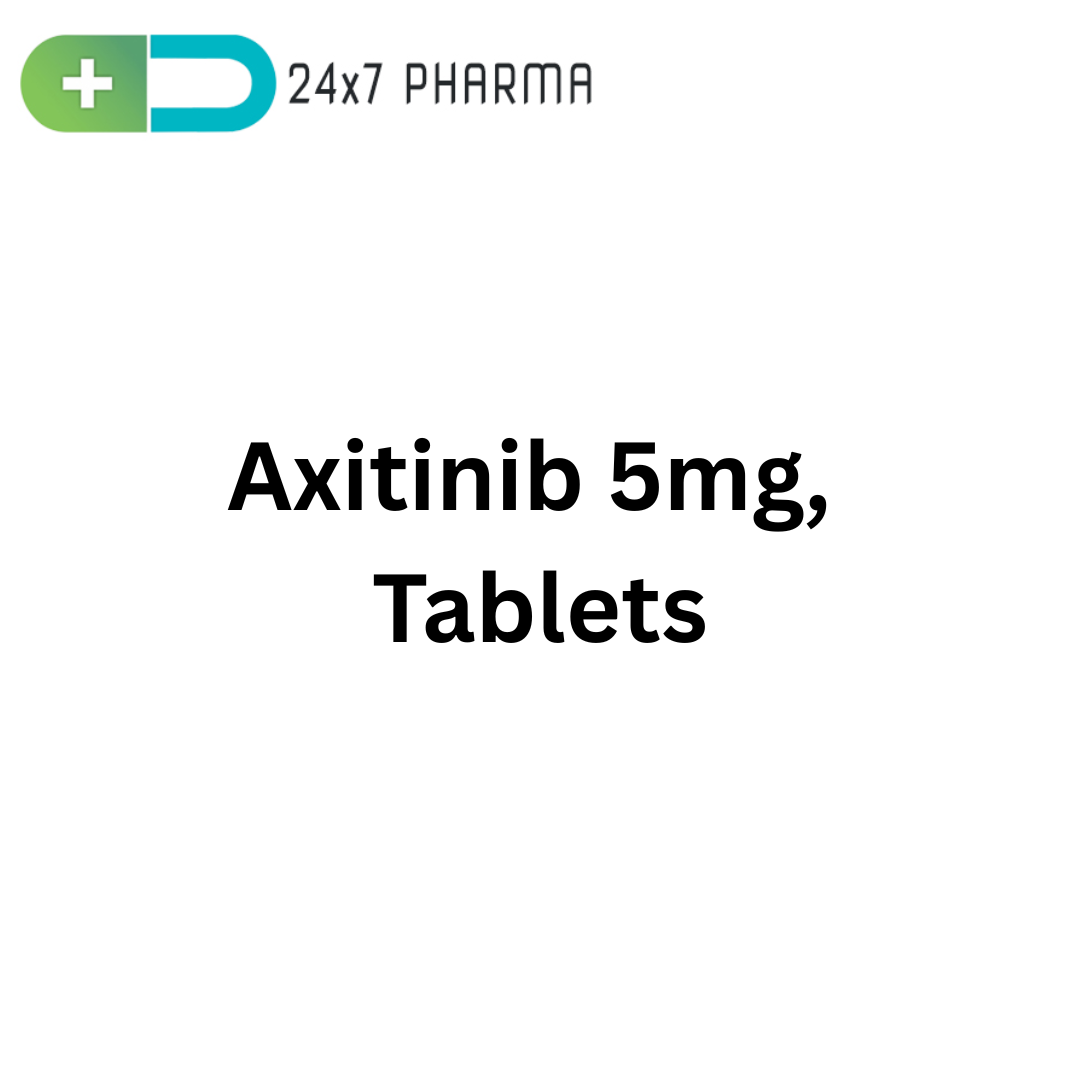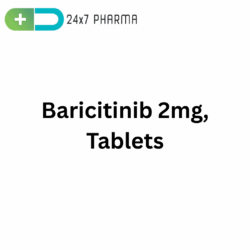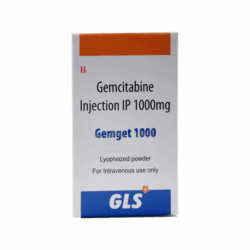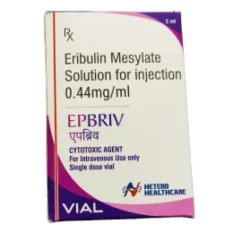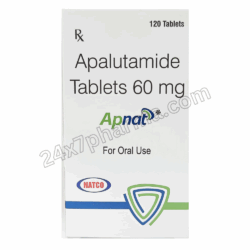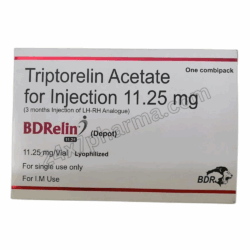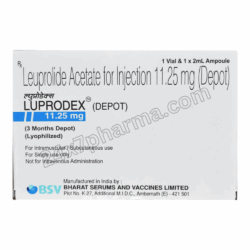LuciAxi 5mg, Axitinib Tablets
LuciAxi 5 mg is a brand name for axitinib, a potent oral tyrosine kinase inhibitor used primarily in the treatment of advanced renal cell carcinoma (RCC) after failure of one prior systemic therapy. By targeting specific receptors involved in tumor growth and angiogenesis, LuciAxi offers a targeted approach to cancer therapy.
What is LuciAxi Axitinib?
LuciAxi is a branded formulation of Axitinib, an oral cancer medication that belongs to a class of drugs known as tyrosine kinase inhibitors (TKIs). It is primarily used to treat advanced renal cell carcinoma (RCC), which is the most common type of kidney cancer in adults.
Axitinib works by inhibiting specific proteins (tyrosine kinases) that are involved in the growth of blood vessels (angiogenesis) that feed tumors. These proteins include VEGFR-1, VEGFR-2, and VEGFR-3 (vascular endothelial growth factor receptors), which are crucial for tumor vascularization. By blocking them, LuciAxi effectively starves the tumor of its blood supply, slowing or stopping its growth.
Axitinib inhibits angiogenesis, the development of new blood vessels required for tumor growth and metastasis, by inhibiting these receptors. This mode of action aids in reducing or stopping the growth of cancerous cells.
Mechanism of Action
Axitinib’s primary mechanism involves the inhibition of VEGFRs, which are crucial for tumor angiogenesis. Additionally, it targets PDGFR and c-KIT, further disrupting tumor blood supply and growth. Studies suggest that axitinib may also induce autophagy, a process that can lead to cancer cell death. Notably, axitinib has shown activity against certain drug-resistant mutations, such as the T315I mutant isoform of the BCR-ABL fusion protein.
Indications
Axitinib is approved for:
- Pembrolizumab or avelumab in addition to first-line treatment for advanced RCC.
- second-line therapy for advanced RCC following the failure of a previous systemic treatment.
Following the failure of one previous systemic therapy, LuciAxi is recommended for the treatment of advanced renal cell carcinoma (RCC). For RCC, it is also used in conjunction with other medications such as pembrolizumab or avelumab.
Dosage and Administration
Axitinib should be started with a starting dose of 5 mg taken orally twice a day, with or without food, and about 12 hours apart.
Modifications to Dosage
- Renal Impairment: For mild to severe renal impairment, no modifications are necessary. In cases of severe renal impairment, use with caution.
- Hepatic Impairment: Mild hepatic impairment is not adjusted for. For children with mild impairment (Child-Pugh class B), cut the initial dosage in half.
Five milligrams of LuciAxi should be take orally twice day, with a 12-hour gap between doses. The dosage can be change according to each patient’s tolerance; it can range from 2 to 10 mg twice a day. The tablets should be consume whole with a glass of water and can be take with or without food. The next dose should be take at the appointed time; avoid taking two doses if a dose is missed or if vomiting happens soon after taking the drug.
Side Effects
Common side effects of LuciAxi include:
- Diarrhea
- Hypertension
- Fatigue
- Decreased appetite
- Nausea
- Dysphonia (hoarseness)
- Hand-foot syndrome (palmar-plantar erythrodysesthesia)
- Weight loss
- Vomiting
- Asthenia (weakness)
- Constipation
Hypertension, hemorrhage, thromboembolic events, and reversible posterior leukoencephalopathy syndrome are examples of serious side effects. Throughout treatment, routine blood pressure and renal function monitoring is advise.
Storage
Keep LuciAxi out of direct sunlight and dampness and at room temperature, between 20°C and 25°C (68°F and 77°F). Keep the drug out of children’s reach, in its original container, and properly closed.
Benefits
- Demonstrated efficacy in prolonging progression-free survival in advanced RCC.
- Can be use in combination with immune checkpoint inhibitors like avelumab and pembrolizumab.
- Oral administration offers convenience over intravenous therapies.
The primary benefit of LuciAxi is its ability to inhibit tumor angiogenesis, thereby slowing tumor growth and progression in advanced RCC. Its targeted action on specific receptors involved in cancer cell proliferation and survival makes it an effective option for patients who have failed prior therapies.
Prescription
As a prescription drug, LuciAxi should only be take under the guidance of a medical practitioner skill in cancer treatment. Depending on each patient’s response and tolerance, dose modifications can be require.
Axitinib can only be purchase with a prescription. Healthcare providers with experience in anticancer therapy should prescribe and oversee its use.
Drug Interactions
- CYP3A4/5 Inhibitors: Concomitant use may increase axitinib exposure; dose reduction may be necessary.
- CYP3A4/5 Inducers: May decrease axitinib efficacy; concomitant use should be avoid.
The cytochrome P450 enzyme CYP3A4/5 is principally responsible for the metabolism of axitinib. Axitinib plasma concentrations may rise when used concurrently with potent CYP3A4/5 inhibitors (such as ketoconazole and ritonavir), which could raise the possibility of side effects. Strong CYP3A4/5 inducers, such as rifampin and phenytoin, on the other hand, may lower axitinib plasma concentrations, which would lessen its effectiveness. Avoiding grapefruit and grapefruit juice is advise since they can raise axitinib levels.
FAQs
What is LuciAxi use for?
To treat advanced kidney cancer (renal cell carcinoma), often after prior therapy.
How do I take it?
Take 5 mg twice daily, about 12 hours apart, with or without food.
What if I miss a dose?
Skip it and take your next dose as scheduled; don’t double up.
Are food interactions a concern?
Yes, avoid grapefruit and CYP3A4-interacting drugs.
Conclusion
Axitinib is a targeted therapy that effectively inhibits angiogenesis in tumors, offering a significant treatment option for patients with advanced RCC. Its oral administration and potential for combination therapy with immune checkpoint inhibitors provide flexibility in treatment regimens. However, careful monitoring for side effects and drug interactions is essential to optimize therapeutic outcomes.
A targeted treatment for advanced renal cell carcinoma, LuciAxi 5 mg (axitinib) provides a mechanism-based strategy to stop tumor progression. Despite its effectiveness, it necessitates close observation for adverse effects and possible drug interactions. To optimize therapeutic advantages, patients should adhere to the dosage and administration guidelines provided by their healthcare professional.

